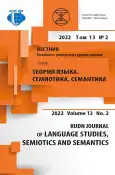The Dictionary of the Author’s Language and Explanatory Dictionaries of the Literary Language: System and Quantitative Correlations
- Authors: Maksimenko O.I.1
-
Affiliations:
- Moscow Region State University
- Issue: Vol 13, No 2 (2022)
- Pages: 307-322
- Section: COGNITIVE RESEARCH
- URL: https://journal-vniispk.ru/2313-2299/article/view/323498
- DOI: https://doi.org/10.22363/2313-2299-2022-13-2-307-322
- ID: 323498
Cite item
Full Text
Abstract
This article deals with the problem of the correlation of the vocabulary of explanatory dictionaries of the Russian language of different types by S.I. Ozhegov with the vocabulary presented in the author’s dictionary - the Dictionary of the Pushkin language. The system parameters of the ratio were revealed during the analysis of the Large Academic Dictionary, the Small Academic Dictionary, the Dictionary of the Pushkin Language and two pieces by A.S. PushkIn: “The Queen of Spades” and “The Captain’s Daughter”. It is shown that one of the effective methods of studying the system properties of probabilistic objects, such as the lexical composition of a language, is the calculation of the distribution. It is shown that the distribution of words by the number of meanings is one of the essential structural characteristics of vocabulary. The concept of a “semantic trigger” is introduced as a carrier of implicit semantic information that triggers a search for the relevant meaning of a polysemic word in the mind of a native speaker. The analysis of the relationship between the dictionary of the text, the consolidated dictionary of the author’s language and the general language dictionary according to the degree of polysemy of the vocabulary presented in them showed that a consistent increase in average characteristics in the text vocabulary up to maximum in Large Dictionary which is associated with the gradual accumulation of values realized in increasingly extensive text arrays, in increasingly diverse contexts. The observed strengthening of the zone of medium-polysemic words in the general language dictionary in comparison with the idiolect dictionary is a reflection of the fact that the most common, repeated for dictionaries of each of the private spheres (following the service words) are commonly used and broad-thematic words occupying the medium-polysemic zone.
Keywords
About the authors
Olga I. Maksimenko
Moscow Region State University
Author for correspondence.
Email: maxbel7@yandex.ru
ORCID iD: 0000-0002-6611-8744
Doctor of Philology (Advanced Doctorate), Professor at the Faculty of Linguistics
24 Very Voloshinoy ul., Mytishi, Moscow reg., Russian Federation, 141014References
- Mel’nikov, G.P. (1978). Systemology and linguistic aspects of cybernetics. Moscow: Soviet Radio. (In Russ.).
- Polikarpov, A.A. (1998). Cyclic processes in the formation of the lexical system of the language: modeling and experiment [dissertation]. Moscow: Moscow State University. (In Russ.).
- Hillis, A.E. (2001). The organization of the lexical system. In: Rapp, B. (Ed.), The handbook of cognitive neuropsychology: What deficits reveal about the human mind. New York: Psychology Press. pp. 185–210.
- Kuznetsova, A.I. (1963). The concept of the semantic system of language and methods of its research. Moscow: MSU. (In Russ.).
- Tarkhova, V.V. Features of a systematic approach to the study of the lexical composition of the language. URL: https://cyberleninka.ru/article/n/osobennosti-sistemnogo-podhoda-kizucheniyu-leksicheskogo-sostava-yazyka (accessed: 15.10.2021). (In Russ.).
- Mayorenko, I.A. The concept of a system and a systematic approach to the study of the lexical composition of the language. URL: https://cyberleninka.ru/article/n/ponyatie-sistemy-isistemnogo-podhoda-k-izucheniyu-leksicheskogo-sostava-yazyka (accessed: 15.10.2021). (In Russ.).
- Makovsky, M.M. (2006). Systemicity and asystemicity in language: the experience of studying antinomies in vocabulary and semantics. Moscow: Kom Kniga. (In Russ.).
- Tuldava, Yu.A. (1987). Problems and methods of quantitative and systematic study of vocabulary. Tartu: TSU. (In Russ.).
- Zipf, G.K. (1945). The meaning-frequency relationship of words. The Journal of General Psychology, 33 (2), 251–256.
- Polikarpov, A.A. (1984). On the system correlation of the main Russian explanatory dictionaries. In: Works on linguostatistics. Tartu: TSU. pp. 38–46. (In Russ.).
- Ozhegov, S.I. (1951). About three types of explanatory dictionaries of the modern Russian language. Voprosy Jazykoznanija, 2, 85–103. (In Russ.).
- Denisov, P.N. (1976). System and coherence in vocabulary and the system of dictionaries In: Problematic of definition of terms in dictionaries of different types. Leningrad. рp. 63–73. (In Russ.).
- Orlov, Yu.K. (1976). Generalized Zipf-Mandelbrot law and particular structures of information units of various levels. In: Computational Linguistics. Moscow: Nauka. рp. 57–60. (In Russ.).
- Dictionary of the Pushkin language: in 4 vols. (1956–1961). V.V. Vinogradov (Ed.). Moscow: State Publishing House of Foreign and National Dictionaries. (In Russ.).
- Pushkin, A.S. (1937–1949). The complete works in 1–15 vols. Moscow: Publishing House of the USSR Academy of Sciences. (In Russ.).
- New materials for the Dictionary of Pushkin language (1982). V.V. Vinogradov (Ed.). Мoscow: Nauka. (In Russ.).
- Dictionary of the Pushkin language: in 4 vols. 2 edition (2000). V.V. Vinogradov (Ed.). Moscow: Azbukovnik. (In Russ.).
- Orlov, Yu.K. (1979). A model of the frequency structure of vocabulary. In: Research in computational linguistics and Linguostatistics. Moscow: Nauka. pp. 65–72. (In Russ.).
- Dolinsky, V.A. (2018). Family of rank distributions in quantitative linguistics. The journals “Vestnik of Moscow State Linguistic University. Humanities”, 6 (797), 124–154. (In Russ.).
Supplementary files









